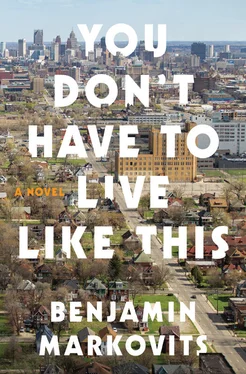Michael was crying and Clarence was trying to push him down by the neck. It wasn’t very easy for me to get him off, Clarence was a heavy kid, and Tony said, “What the fuck’s going on in here?” and he pulled off Clarence himself, who started crying, too.
“I don’t want you touching my boy, you understand that?” Tony said. “I don’t want you touching my boy.”
“It wasn’t his fault,” I told him.
“What the fuck are you doing, standing around with a paper towel?” Tony said. It’s true, I had a paper towel in my hand. After Clarence threw the milk I went into the kitchen to get something to clean it up with, and that’s when he went for Michael’s throat.
Tony took Michael to the bathroom to dry him off, and when he came out, he said, “I don’t want this boy hanging around my son. Never again,” and walked out.
Later that night I called their house and spoke to Cris, and then asked to speak to Tony. I told him what had happened, but he said, “You think this is just a kid thing, you think this happens all the time. But kids don’t go for other kids’ necks, not like that. His father is a violent angry Negro. I don’t want my son hanging out with his son. If that’s a problem, let me know, and I won’t bring him by the house.”
I didn’t mention any of this to Nolan or Mrs. Smith, and maybe Clarence didn’t either because he thought he might get in trouble, I don’t know. But they never said anything to me about it.
THERE WAS A GENERAL FEELING in the neighborhood, which I didn’t totally share, that the old Detroit blacks should be grateful to us, for pushing up their property prices and giving some of them domestic employment, mowing lawns, painting walls, that kind of thing, and bringing in stores and bars and restaurants where before there were boarded-up shops. But the stores weren’t cheap and the truth is, you didn’t see many black faces at Joe Silver’s coffeehouse, for example. Most of the old residents kept to themselves.
One of the guys who took a more cynical view of the whole business was Steve Zipp, which is maybe why I liked him. We started hanging out a little. Every other weekend he had this baby to look after, which he didn’t know what to do with, and sometimes he came by Walter and Susie’s apartment, because Susie was very hands-on with other people’s babies. He felt intimidated by actual parents, he said.
Steve was a funny guy once you got past appearances. He looked like an accountant and that’s what he was. His clothes were too big, and he often wore his work shoes, which were black and shiny, under chinos on the weekend. When he was cold, he put his suit jacket over the top of his sweater. From the country that brought you the pita chip! — that’s the kind of thing he said. I mean, he actually said it, in his football announcer’s voice, when there was some stupid commercial on TV, selling something you never knew you needed and which probably wouldn’t work anyway. A lot of things about America struck him as basically ridiculous.
He was also very suspicious of Robert James. He said the numbers didn’t add up. Steve had gone to city hall and checked the public records, and somebody was either hemorrhaging money or there were private investors we didn’t know anything about. You couldn’t buy up two thousand houses in Detroit and sell them back at this rate without taking a big hit. Not if you were paying for health insurance, too, and contributing to the infrastructure costs. Unless you had some under-the-table deal, with the city or somebody else, to sweeten the pot.
The reason he had a baby was that an old friend of his from high school wanted to have a baby, and when she turned forty-two years old and wasn’t married and didn’t have a boyfriend, he offered her his sperm. He didn’t expect to have anything else to do with the kid, he was kind of going through a midlife crisis himself, but it turned out having a baby was a full-time no-joke. So he volunteered to do his part. The kid’s mother lived in Toledo; she worked at the university hospital there. Steve grew up in Toledo, which is where they both went to high school.
Three years ago, he’d moved back home to start an accountancy practice, leaving behind a fairly safe job at KPMG in Cleveland. Just a perfect time to start a business, he said. These days, of course, even KPMG was cutting working hours and asking people to take part-paid leave. Whenever he had any regrets, he reminded himself of these facts. His practice never got off the ground, the house he had just bought was losing equity, so he wiped out his savings by selling it and applied to Starting-from-Scratch-in-America. But the baby thing is what really set him off — you need to live in a manner you wouldn’t mind passing on. One of the things that kept him busy in Detroit was Internet dating.
Steve introduced me to the E-change, which was set up by a kid named Nathan Zwecker, who used to work at the server farm. It was a kind of Craigslist site for everybody from the five neighborhoods, based on what Steve called the “Burning Man model.” Basically, anybody who wanted anything or had anything to barter, from a secondhand car to an empty seat at a dinner party, posted it on the site, and because the community was really very small and interconnected and geographically concentrated, it got a lot of traffic.
Zwecker became something of a big cheese — I did one of my profiles on him for the newsletter. He was pleasant-looking, with a round face and pale hair, quite formal, tall, a little overweight. In another life he might have been a priest. Or a rabbi, I guess. When I met him he was twenty-three years old, a Pomona dropout, who got hired full-time by some San Francisco tech company after a summer internship. One of the things he worked out is that people in the five neighborhoods wanted to respond very quickly to each other in specific ways, so he figured out how to map every post according to time and place and the kind of posting. The programming wasn’t particularly complicated, he said, it was mostly a design issue. It needed to look good and easy. The point of the project, as he understood it, was to take a virtual community and make it real, give it real estate, fill it with people, etc., but that also put a certain pressure on the virtual sites to keep up, in real time.
Robert James invited him to some of their business conferences. Clay Greene consulted him about his book. They even started talking like Zwecker in TV interviews. “Basically,” Robert said, “the idea behind the whole place, what got us started, is that we wanted to take a virtual community and make it real.” He was sitting on a rigged stage, heavily made-up, surrounded by lights, with the cameras fixed on him, and looking totally natural and like himself. This was at the big MDP fund-raiser held at the old Wayne Conner plant, about a week after Thanksgiving. All kinds of people came, the mayor, Bill Russo and his crowd, some of the top brass from the UAW. Obama came, and was supposed to bring his wife and kids, but in the end only the president made it. But I’m getting ahead of myself.
Steve Zipp spent a lot of his time on the E-change. He was one of those people who could carry on a conversation while scrolling around on his phone. “You think I’m not making eye contact because of this thing,” he once said to me. “I never used to look people in the eyes anyway.” If some girl posted she was going to Ikea in an hour and needed muscle, Steve checked out her profile and volunteered to ride along. This way you got to meet girls without any date pressure. The E-change worked like an eBay site. People got ratings. So if you went along and creeped out that girl by making inappropriate passes over the meatballs, your ratings took a hit, and nobody would invite you along to anything else. Steve obsessed about his rating, which was high for somebody who made his kind of first impression. He was an amusing person to have around. “I only make appropriate passes,” he said.
Читать дальше












